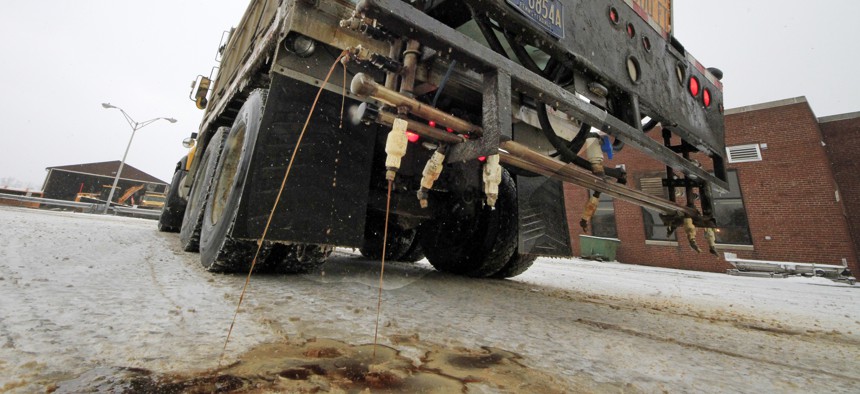A Proposal to Treat Icy Winter Roads with Beet Juice

In a demonstration, a Pennsylvania Department of Transportation anti-icing truck sprays a de-icing cocktail of brine and beet juice on the driveway of PennDot's Butler, Pa., maintenance facility, Monday, Jan. 6, 2014. Associated Press

Connecting state and local government leaders
Lawmakers in Michigan want the Department of Transportation to study the feasibility of adding beet juice to road salt to treat icy roads in the winter.
If lawmakers in Michigan have their way, winter driving in the Mitten State could get a whole lot sweeter.
A proposal awaiting a hearing in the state legislature would require the Michigan Department of Transportation to launch a pilot study on the use of “organic additives,” including juice from sugar beets, to “control ice on public roads, highways and bridges.”
The beet-juice solution, already in use in several places, wouldn’t replace traditional road salt, but mix with it to create a sticky substance that some transportation officials say adheres longer and more effectively to the roads. The solution would reduce the state’s reliance on traditional salt, helping to reduce runoff while also preventing ice from forming. It’s overall less costly and poses fewer environmental problems than plain salt, according to state Rep. Brian Elder, a Democrat and the bill’s main sponsor.
“To secure safe, quality roads for Michigan families to drive on and to protect our natural resources, we need to get creative and implement sustainable solutions,” Elder said in a statement. “Adding natural components to reduce salt usage on our roads will not only make our safety efforts more effective during the tough winters, it will ensure that, come spring, the ‘Pure’ remains in Pure Michigan.”
Under the bill, DOT officials would be required to test the substance in at least five places that contain “roads, highways and bridges that are subject to deterioration from salt,” as well as a body of water that’s at “high risk” of contamination from chloride runoff. Results would be due back to the legislature by the end of 2022, and would include steps for “increasing statewide use of organic additives.”
The pilot program could cost between $25,000 and $50,000, depending on the number of road miles that will need to be treated, according to a fiscal analysis. But statewide implementation would likely save money due to both the reduced use of salt and man hours, the document said.
Several cities in Michigan, including Frankenmuth and Farmington Hills, already treat their icy roadways with “sugar beet byproducts from farms in Michigan,” according to a committee analysis on the Senate version of the bill. Public works officials from Farmington Hills told legislators that the addition of beet byproducts had decreased the city’s salt use by 30 percent, largely because the mixture keeps the roads clear for longer periods of time, and in colder temperatures, than salt alone.
Michigan is a top producer of sugar beets—farmers in the state harvested 4.9 million tons of the vegetable in 2016, according to estimates from the state Department of Agriculture—and is home to the third-largest beet-sugar processor in the country, meaning that much of the additive could be obtained from local sources.
The Senate version of the bill passed 34-2 in October. Elder’s version is awaiting a hearing before the House Committee on Transportation.
Kate Elizabeth Queram is a Staff Correspondent for Route Fifty and is based in Washington, D.C.

NEXT STORY: For a City That Didn’t Burn, Challenges Continue a Year After California’s Most Destructive Wildfire




